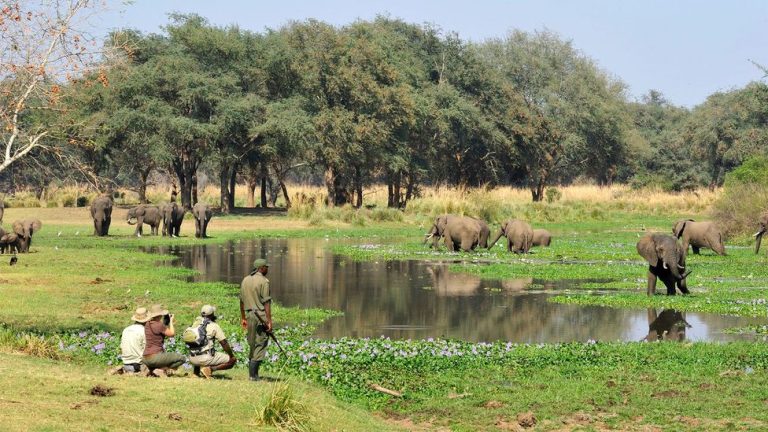In an era where environmental sustainability is crucial, travelers increasingly seek ways to explore the world without leaving a negative footprint. Sustainable travel isn’t just a trend; it’s a responsible way to experience destinations while preserving their natural and cultural heritage for future generations. This guide provides practical tips, destination recommendations, and insights into eco-friendly practices that every conscious traveler can adopt.
Understanding Sustainable Travel
Sustainable travel, also known as eco-tourism or responsible travel, involves making mindful choices that benefit the environment, support local communities, and respect cultural heritage. It encompasses everything from reducing carbon emissions to promoting biodiversity conservation and supporting fair economic practices.
Eco-Friendly Destinations
1. Costa Rica: A Leader in Ecotourism

Costa Rica has long been a pioneer in sustainable tourism, with over 25% of its land protected as national parks and reserves. Visitors can explore lush rainforests, engage in wildlife conservation efforts, and stay at eco-lodges committed to minimizing environmental impact.
2. Norway: Embracing Green Practices

Norway offers stunning fjords, glaciers, and a commitment to sustainable tourism. Travelers can enjoy eco-friendly activities like hiking, whale watching with responsible operators, and staying in energy-efficient accommodations.
3. New Zealand: Adventure and Sustainability

New Zealand’s commitment to protecting its natural landscapes makes it a prime destination for eco-tourism. From the geothermal wonders of Rotorua to the pristine beaches of Abel Tasman National Park, there are countless opportunities for sustainable travel experiences.
4. Bhutan: High Value, Low Impact Tourism

Bhutan’s “High Value, Low Impact” tourism policy limits the number of visitors to protect its culture and environment. Travelers can immerse themselves in the country’s rich heritage while contributing to sustainable development through the daily tourist tariff.
5. Kenya: Conservation and Community Engagement

Kenya offers unique opportunities to witness wildlife in its natural habitat. National parks like the Maasai Mara and Amboseli promote conservation and community-based tourism, where visitors can support local Maasai communities through eco-lodges and cultural experiences.
Choosing Sustainable Accommodations
1. Eco-Lodges and Green Hotels
Look for accommodations certified by programs like Green Key or LEED that prioritize energy efficiency, waste reduction, and water conservation. These establishments often use renewable energy sources and support local communities through employment and sourcing.
2. Homestays and Community-Based Tourism
Opt for homestays or community-owned lodges where your stay directly benefits local families or indigenous communities. This type of accommodation provides authentic cultural experiences while contributing to local economies sustainably.
3. Farm Stays and Agritourism
Experience rural life and support sustainable agriculture by staying on eco-friendly farms. Agritourism allows travelers to participate in farm activities, enjoy fresh produce, and learn about sustainable farming practices.
4. Treehouse Hotels
Treehouse hotels offer unique and eco-friendly accommodations that minimize land impact and provide an immersive nature experience. These lodgings often use sustainable materials and offer opportunities for wildlife observation.
5. Sustainable Boutique Hotels
Many boutique hotels prioritize sustainability by implementing green practices such as solar energy, water recycling, and organic toiletries. They also often support local artisans and producers, enhancing the cultural and economic benefits for the community.
Sustainable Travel Practices
1. Reduce Your Carbon Footprint
- Choose Sustainable Transportation: Opt for trains, buses, or hybrid/electric vehicles when possible. If flying, consider carbon offset programs.
- Pack Light: Minimize luggage weight to reduce fuel consumption during transportation.
- Use Public Transport or Walk/Bike: Explore destinations using public transport, walking, or biking to reduce your carbon emissions and experience the locale more intimately.
2. Respect Local Culture and Wildlife
- Cultural Sensitivity: Learn about local customs and traditions before visiting. Respect religious sites, dress codes, and local norms.
- Wildlife Conservation: Support ethical wildlife experiences and avoid activities that exploit animals for entertainment.
- Leave No Trace: Follow the “Leave No Trace” principles by minimizing waste, sticking to trails, and not disturbing wildlife.
3. Support Local Economies
- Buy Local: Purchase goods and services from local vendors to support the community’s economy.
- Eat Local: Enjoy meals at local restaurants, and try regional dishes to support local agriculture and reduce food miles.
- Hire Local Guides: Employ local guides to enhance your travel experience with authentic insights and directly benefit the community.
4. Minimize Waste
- Bring Reusable Items: Carry a reusable water bottle, shopping bag, and utensils to reduce single-use plastic.
- Proper Waste Disposal: Dispose of waste properly and recycle whenever possible. Avoid products with excessive packaging.
- Eco-Friendly Toiletries: Use biodegradable soaps and shampoos to minimize environmental impact, especially when camping or staying in eco-lodges.
5. Conserve Water and Energy
- Short Showers: Take shorter showers to conserve water, especially in areas prone to drought.
- Energy Efficiency: Turn off lights, air conditioning, and electronic devices when not in use. Choose accommodations that use renewable energy sources.
- Towel and Linen Reuse: Opt to reuse towels and linens instead of having them washed daily to save water and energy.
Supporting Conservation and Community Projects
1. Volunteering Opportunities
Many destinations offer volunteer programs focused on conservation efforts, such as reforestation, marine conservation, or wildlife monitoring. These experiences allow travelers to contribute directly to environmental protection while learning from local experts.
2. Sustainable Souvenirs and Local Products
Purchase souvenirs made by local artisans using sustainable materials. Avoid products made from endangered species, coral reefs, or ancient artifacts, which contribute to illegal wildlife trade and cultural heritage depletion.
3. Participate in Conservation Programs
Join conservation programs or eco-tours that directly support environmental protection efforts. Activities might include beach clean-ups, tree planting, or wildlife monitoring.
4. Support Community-Based Tourism
Engage in community-based tourism initiatives where your travel expenditure directly benefits local communities. Participate in cultural exchanges, stay in community-run accommodations, and support local businesses.
5. Donate to Local Projects
Consider donating to local conservation or community development projects. Many organizations work tirelessly to protect the environment and support communities, and your contributions can make a significant impact.
Sustainable travel is not just about where you go, but how you travel and the impact you leave behind. By adopting eco-friendly practices, supporting local communities, and respecting natural environments, travelers can make a positive difference while enjoying enriching travel experiences. Whether exploring pristine rainforests in Costa Rica, witnessing the Northern Lights in Norway, or engaging in community-based tourism in Kenya, every journey can contribute to a more sustainable future.
Additional Resources
- Sustainable Travel Organizations: WWF, Sustainable Travel International, Ecotourism Australia.
- Green Certifications: Green Key, LEED, EarthCheck.
- Carbon Offset Programs: Carbonfund.org, Atmosfair, MyClimate.
References
- Sustainable Travel: A Guide for Travelers (WWF)
- The International Ecotourism Society (TIES)
- United Nations World Tourism Organization (UNWTO)







Leave a Comment